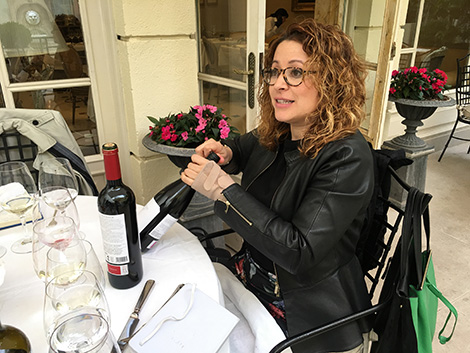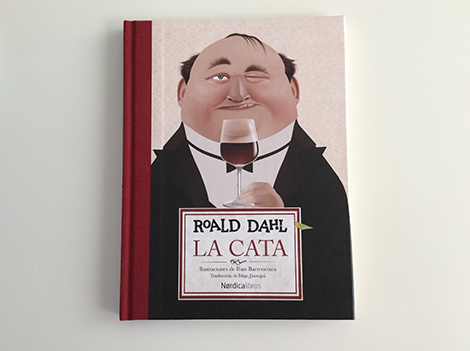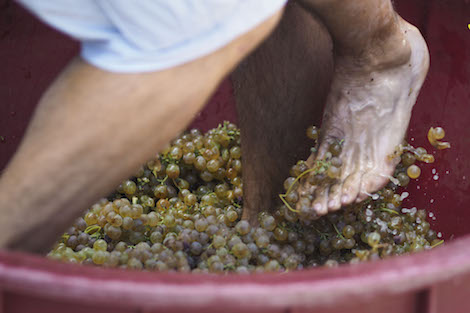
Just as if she were an endurance runner, Almudena Alberca has managed to follow the demanding programme of the Institute of Masters of Wine while working long hours as a winemaker. In her nine years as candidate ("the last six I have studied much more seriously," she reckons), throwing in the towel was never an option.
Winemaker at Viña Mayor in Ribera del Duero and at two other wineries owned by the group Bodegas Palacios in Rueda and Toro, Alberca is the first Spanish woman to obtain the title. She joins Pedro Ballesteros, who became MW in 2010, and colleagues Fernando Mora MW and Andreas Kubach MW who joined the Institute last year.
Born in Madrid, Almudena Alberca, 39, grew up in Salamanca and studied Agriculture Engineering in Zamora, the land of her parents. While doing an internship at Cooperativa del Soto in Villanueva de Campeán (Tierra del Vino, Zamora) in 2003, she met Jorge Ordóñez, Víctor Rodríguez and Javier Alén, the successful trio behind Viña Nora in Rías Baixas and Bodegas Naia in Rueda who were about to set up Cénit in the area. Although still at university, she joined Cénit and started working closely with Amy Hopkinson, the New Zealand winemaker in charge of the winery.
In the following interview you can read about her beginnings, how she coped with the MW programme, and her experiences and vision of the world of wine.
When did you decide to devote your life to wine?
It was just after I came back from a three-month stay in New Zealand in 2005 where I experienced a great cultural exchange and discovered how dynamic the world of wine could be. I worked with a Japanese guy and several Americans, South Africans, Australians… All of them were very knowledgeable and had traveled around the world. Starting Cénit was great fun but New Zealand really left its mark on me.
What are your memories of Cénit?
It was really educational thanks to Jorge, Víctor and Javier but particularly to Amy. Setting up a winery from scratch is a little like jumping into a pool when you cannot swim. The place was so isolated that we had to do most of the jobs ourselves.
How did winegrowers react to being directed by two women? In Tierra del Vino there were cooperatives, men, Amy and me, so you can imagine how difficult it was to get things done: picking grapes at the right time or pointing anything that was wrong… You could say they were slightly reluctant (laughs), but the truth is that nobody had tried to make high-quality wine there before. Given the diversity of soils and the high number of small plots, the hardest part was to improve processes and work flows paying more attention to detail. The area was at a very basic stage. Grape growers were payed based on alcohol levels and they got their money through the cooperative so they didn’t see the benefits right away. It took five to six years to change this mentality.
Did you ever feel that you had to work harder or prove yourself harder than your male colleagues?
I was very lucky to start my career working for a modern company that had hired a female winemaker from New Zealand. I was young and had no family ties to wine, so I had to work very hard. Being a young woman is an issue but when I was in New Zealand I met well-trained professionals who had worked 12 harvests all over the world and still were working there as labourers. I realised how important it was to study and be well-trained.
Why did you decide to follow the MW programme?
I had passed WSET levels 2 and 3 and had a master in oenology which together with my five years of working experience enabled me to join the programme. Working with Amy was fantastic as I learnt about vines, winemaking, travelling and doing presentations but we were relatively isolated in Tierra del Vino. I had discovered my passion and I wanted to learn more and get in touch with people from other places.
How were your first steps in the MW programme?
I did my first seminar in 2009. The first three years were a kind of initial contact as at the end of 2008 I became chief winemaker at Cénit after the group was sold to Avante Selecta and in 2010 I was hired by Dominio de Atauta in Ribera del Duero. Those were years of very hard work —I couldn’t devote much time to the programme.
What changes did it bring to your life?
You definitely grow as a professional. The programme involves a lot of reading, travelling and tasting but it is not only about trying the wines; you have to know where they come from and the existing legislation in each country. Almost imperceptibly, I started applying the knowledge I had acquired to my work and life. It made me be more objective when tasting my own wines back at the winery. It’s an intensive training process, not unlike a professional athlete. And you are wonderfully exposed to many professionals and experts in different fields. It’s really inspiring.
Is the programme hard to follow when you have a full-time, demanding job? How many hours do you work on an average day?
Usually 10 to 11 hours. The first years were really hard, but I have always used most of my holidays and weekends to study. In recent years I often took Fridays off because I found it really hard to change activities in the same day so I would work hard at the winery from Monday to Thursday and study during the rest of the week. You feel exhausted, but it becomes part of your routine. There were periods when I travelled intensely to the US, UK and Switzerland and spent as many as three nights a week abroad. I guess it’s easier to cope when you are young but you really have to take care of yourself: eat well, practice sport, sleep…
Is it easier to follow the MW programme in Spain now compared to when you started?
Yes, considerably easier. Back then there were no guidebooks to tell you what to do. Tasting lessons merely involved reading our tasting notes aloud. But the new generations of MWs are more open-minded. Now you have guidelines to answer questions, what you are supposed to talk about or the type of information you are expected to provide. This change in philosophy has to do with the fact that teachers are younger now.
Is this a very English way of working?
We Spaniards and Mediterranean people have a different education system. In a way it’s as if you had to reset your brain to answer questions in a different way. It has taken me a great deal of effort to understand this way of thinking but I apply it almost inadvertently in my daily life now.
Is there a particular camaraderie between female candidates?
There’s a good relationship among students in general. As we travel a lot and usually share hotel rooms to cut costs, friendships arise naturally.
Only one third of Masters of Wine are women: 125 out of 245 according to figures provided by the Institute of Masters of Wine during its symposium held in Logroño in June.
While men can often rely on women to help out, life is not easy for working women who don’t want to forgo motherhood. The higher proportion of males is also linked to the fact that the early days of the industry were dominated by men.
Do you think women approach wine in a different way or this is not relevant among highly qualified professionals?
As in all professions, some people have a gift, some don’t; if you don’t have it, you must train hard. I think that women are more sensitive but this is not a competitive advantage when you reach a high level of professionalism. Then there are super tasters just as there are super musicians. After having worked alongside many women, I have found that tenacity and resilience are two features that describe us well.
Do you expect that your appointment as MW will encourage other Spanish women to aim for the title?
I hope so. When I started, the programme wasn’t well-known in Spain but it has become more popular now. I always encourage everyone to study and become a well-trained professional.
Can you recall the hardest and most rewarding moments as a MW candidate?
Everything is tough and intense but perhaps the hardest part is to use a foreign language. I have always written my tasting notes in English, but I feel that I missed some nuances in my essays. At the beginning I found it very hard to follow the lessons and felt that I might be overlooking key issues. As you are not fluent in English you may not be the most interesting person to your classmates either. I never felt frustrated about it though; I just took my time to finish.
Did you ever consider giving up?
Never. This is what happens when you are a stubborn girl from Zamora. At first, I saw the programe as an extra to my work to which I devoted my energies. It was worth the effort because I could continue to grow as a profesional. But at one point I realised that I really had to go for it.
What’s the first thing you plan to do as Master of Wine?
Sleep peacefully (laughter) and guilt-free. I’m open to all kinds of things but to tell you the truth I have been so focused on working and studying that I haven’t really look beyond that. Nevertheless, I’m interested in consulting and would love to manage different projects.
What’s the subject of your research paper?
A comparative analysis of filtration techniques for young oaked Tempranillo wines from Ribera del Duero.
How would you explain it in lay terms?
The aim is to improve the quality of bottled wine by using the most suitable techniques. By extrapolating trends, I have tried to establish a model that can be useful for winemakers. Most of them filter wines based on their experience or on the equipment available in their wineries.
Could you briefly answer this exam question? Weaknesses and strengths of Spanish wine.
In terms of strengths, Spain is an extremely rich country boasting a great diversity of grape varieties and a fantastic climate to grow grapes organically across wide parts of its territory. The main weakness is that we are not good at communicating this, don’t know how to do it (or are not allowed to do it). Despite being one of the world’s leading wine producing countries, Spanish wine prices are too low. This places us at a disadvantage because we are not capable of generating value right from the base.
How can Spanish MWs contribute to Spanish wine?
By communicating our wines better and particularly by giving them greater visibility. The more well-trained professionals we have, the better for the Spanish wine industry as a whole.

Amaya Cervera
A wine journalist with almost 30 years' experience, she is the founder of the award-winning Spanish Wine Lover website. In 2023, she won the National Gastronomy Award for Gastronomic Communication
Wine tastings in September 2018
NEWSLETTER
Join our community of Spanish wine lovers






